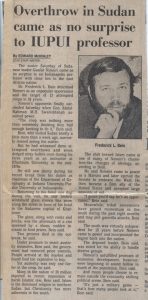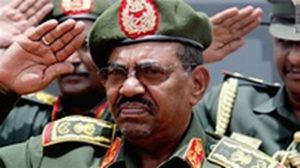53 Escape from Khartoum

In the summer of 1985 following a three-week IUPUI teaching tour in Ras Tanura, Saudi Arabia, I stopped in Khartoum on the way back to the USA. My four-day mission was to see how things had
changed in the last 8 years. I went directly to the University of Khartoum and met my old colleague Abu Sin who was the Head of the Geography Department. We drove south to the Gezira Scheme, one of the largest irrigation projects in the world, which produces many crops for local consumption and for export.

Furrow irrigation in the Gizira Scheme. Photo by Rick Bein 1985.
The Gezira Irrigation Scheme was established in 1925 and enlarged to its present capacity of 882,000 hectares of irrigable area in the early 1960s. The scheme occupies the area between the Blue and the White Niles about one hour south of Khartoum, the Sudanese capital.
After my short and productive visit, I was waiting on the tarmac for my flight out, and President Gaafar Nimeiry was returning from the USA. As his plane was landing, he was informed there was an ongoing military coup and the rebels were waiting to arrest him at the airport. Before he got off the plane, he decided it was time to flee the country and ordered the plane to take off again. As the coup began my plane was already taxiing on the runway and managed to take off and was the last plane to leave Khartoum before the military closed the airport. I only learned of this close encounter when we landed in London. The Khartoum airport was then closed for three weeks and I was lucky not to have missed the beginning of the IUPUI Fall Semester classes.
A side note: This coup was the start of a series of coups from 1985-1989 ending when Omar Bashir took control and reined until 2019 when he was deposed by a citizen uprising mostly of thousands of women. The military was stymied because the soldiers refused to shoot the women who were demanding that Bashir step down and turn the government into a democracy.
Bashir’s generals found that the only solution was to depose him and take control themselves. He was sentenced to 2 years in prison. Unfortunately, the new regime is made up of the generals who created another dictatorship. Currently there is tremendous clamor at home and abroad to begin democratization and turn the country over to citizen rule.
 Omar Bashir
Omar Bashir
The Guardian newspaper reported in July 2019 that: “The military rulers of Sudan have reached a power-sharing deal with opposition members to cover the next three years until elections are held”.
On January 12, 2020, Nyamilepedia reports: “South Sudan’s President Salva Kiir and the opposition leader Riek Machar have finally agreed to form a unity government by February 2020 after long talks held in the capital, ending rising tensions in the country and giving Sudanese people hope for lasting peace in the region”. There is still a lot of flux about this deal. The plan was to run the country with a shared responsibility between the military and a civilian elected government. After three years, the government would continue by civilian rule.
Unfortunately, the unity government only lasted unit October 2021 when the military decided that it would take control and arrested the civilian government leaders. At this point a chaotic situation exists with demonstrations in the streets and the military blocking the effort with bullets and arrests. Many have died.
Omer Bashir is now serving a two year sentence in a Sudanese prison. But, the World Court has a warrant out for his arrest for his crimes against humanity.
Rick Bein, 8 April 2022.

